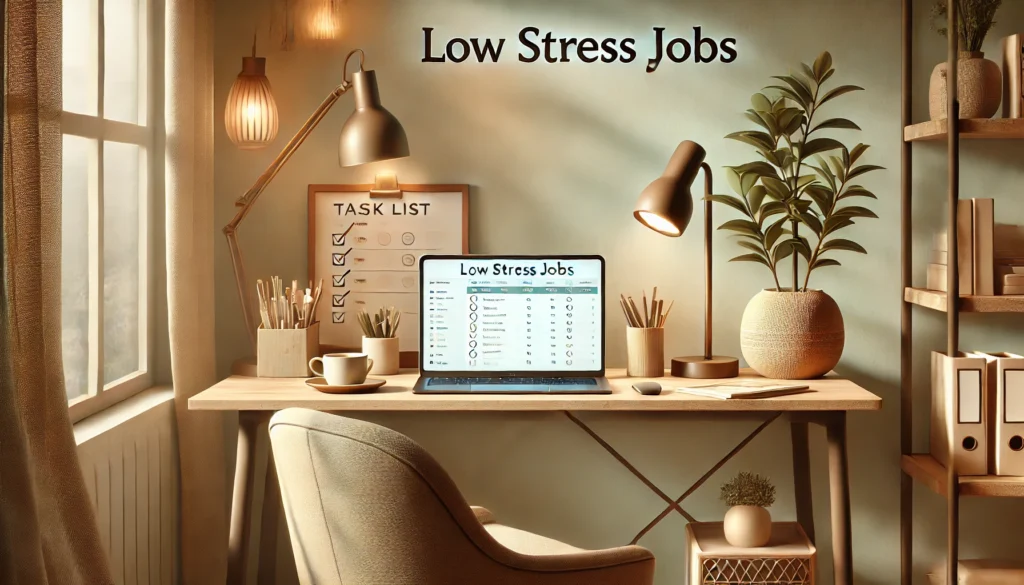Introduction
In today’s fast-paced world, many individuals find themselves trapped in stressful work environments that take a toll on their mental and physical health. According to various studies, workplace stress is one of the leading causes of anxiety, depression, and burnout. In fact, nearly 80% of workers report feeling stressed about their jobs at some point. This statistic underscores the importance of finding a career that promotes a balanced, fulfilling life. Low stress jobs not only allow you to maintain mental peace, but they also improve overall wellbeing and job satisfaction.
The idea of a low stress job might seem elusive, but there are a variety of career paths that can offer a peaceful and rewarding experience. Whether you are considering a career change or just beginning your job search, choosing a job with minimal stress is key to long-term happiness and health. In this article, we’ll dive into what makes a job low stress, explore some of the best low stress career options, and provide tips on how to find the perfect job for you.
What Defines a Low Stress Job?
A low stress job is one that minimizes the mental and emotional strain typically experienced in a traditional work environment. Stressful work environments often stem from factors like tight deadlines, difficult bosses, excessive workload, or toxic office culture. In contrast, low stress jobs are characterized by flexibility, low-pressure expectations, supportive work environments, and tasks that don’t create overwhelming pressure.
One of the key factors that define low stress jobs is work environment. Jobs in peaceful settings, such as a quiet office or outdoor job, tend to reduce stress levels. Another important factor is job responsibilities—low stress jobs typically involve manageable tasks that don’t demand long hours or high levels of multitasking. Work-life balance plays a crucial role as well. Jobs that offer flexible schedules or remote work options contribute to an individual’s ability to maintain a healthy balance between personal life and professional obligations.
Additionally, job security and the autonomy to manage one’s work independently help in reducing stress. Low stress jobs allow individuals to work at their own pace and have control over their daily tasks. Lastly, the company culture and a supportive team environment are essential in fostering a stress-free workplace. When you feel supported by your coworkers and management, it significantly lowers anxiety levels.
Top Low Stress Jobs to Consider

There are numerous low stress jobs across different industries. Let’s explore some of the top low stress career options that can enhance your work-life balance.
Creative Jobs
Creative professions tend to offer a peaceful work environment where individuals can focus on their artistic expression without high levels of pressure. Graphic designers, for instance, have the flexibility to work either in a studio or remotely. The work is project-based, and designers often have control over their deadlines. This autonomy in managing their time makes graphic design a great low stress job.
Writers and editors are also in demand for their ability to create content, whether for websites, books, or blogs. This role offers the opportunity to work from home, set your own schedule, and be creative. Similarly, photographers enjoy a flexible work schedule and can choose to specialize in areas like nature photography, which is less stressful compared to the fast-paced world of photojournalism. These creative jobs are fulfilling, offer low stress levels, and provide the freedom to work at your own pace.
Health and Wellness Careers
For those interested in promoting well-being, health-related careers can be both rewarding and low stress. Massage therapists have a calming influence on their clients, and the work environment is generally relaxed. In addition, many massage therapists work independently or in spas, providing them with a flexible schedule and a tranquil environment. Similarly, yoga instructors experience minimal stress while guiding others toward physical and mental relaxation. Teaching yoga often occurs in peaceful settings, which fosters a calm atmosphere for both instructors and students.
Another option is becoming a nutritionist, a profession that allows you to work with individuals to improve their dietary habits. Nutritionists typically work in hospitals, private practices, or as consultants. The role involves helping people maintain healthy lifestyles, which is fulfilling without the stress often associated with other healthcare professions.
Technology and Data-Related Jobs
The tech industry offers numerous low stress career options that often come with flexibility. A data entry specialist works with information and databases, often with minimal interaction with clients. This job requires attention to detail but does not involve high-pressure environments or tight deadlines. Software developers working remotely have the advantage of designing and coding from the comfort of their homes, reducing the stress caused by office dynamics or commuting. Similarly, web designers can work on their own schedule, allowing for a calm, focused workday without the chaos that accompanies many corporate settings.
Education and Social Services
If you enjoy helping others, working in education and social services might be a fulfilling and low stress career path. Librarians, for example, work in quiet, controlled environments where they assist people in locating resources. Libraries offer peaceful work environments and the role typically doesn’t involve stressful demands or aggressive timelines. Tutors, especially those who work independently or in small groups, also experience minimal stress as they help students grasp new concepts at their own pace.
Another career in social services with lower stress levels is being a social worker, particularly those who focus on non-crisis cases such as helping elderly people or offering counseling. These roles generally involve stable, predictable environments that prioritize client well-being without the urgency often found in emergency settings.
How to Choose the Right Low Stress Job for You

Choosing the right low stress job depends on understanding your personal strengths, preferences, and work style. To begin with, consider what aspects of your current job cause you the most stress. Is it the deadlines, the workload, or the lack of autonomy? Identifying these stress triggers will help you make a more informed decision when exploring career options.
It’s essential to balance passion and practicality. While it’s important to pursue a career you’re passionate about, you also need to evaluate if the job offers sufficient opportunities for growth and income. Consider jobs that align with your personal interests and provide a positive, low-stress work environment.
Another factor to consider is company culture. A company that values work-life balance, offers flexible hours, and fosters a supportive work environment will contribute significantly to reducing stress. Additionally, jobs that offer the option for remote work can alleviate stress by eliminating the daily commute and allowing you to set up a comfortable, personalized workspace.
Benefits of Low Stress Jobs for Your Overall Wellbeing
Low stress jobs have a significant impact on your overall wellbeing. One of the most important benefits is the reduced risk of burnout. High-stress jobs lead to mental exhaustion, which, over time, can result in burnout. Low stress jobs allow individuals to recharge and prevent the physical and emotional toll that comes from constant pressure.
These jobs also promote better work-life balance, which is essential for maintaining relationships, pursuing hobbies, and maintaining mental health. When you’re not constantly overwhelmed by work, you can enjoy your personal life to the fullest.
Additionally, low stress jobs contribute to improved physical health. Chronic stress is associated with various health problems, such as high blood pressure, heart disease, and anxiety. By choosing a low stress job, you are investing in your health and future. Job satisfaction is another key benefit. When you feel at ease in your work environment, your overall job satisfaction increases, making your career more fulfilling in the long term.
Conclusion
Low stress jobs offer a balanced and healthy approach to career development. These roles not only reduce the physical and emotional toll of work but also promote long-term wellbeing and job satisfaction. Whether you are in a high-stress role looking for a change or just starting your career, there are plenty of low stress job options to explore.
By understanding the factors that contribute to a stress-free job, identifying the right career path, and choosing a company with a positive culture, you can make a lasting change to your work-life balance. Pursuing a career that promotes peace and fulfillment is not just possible—it’s essential for maintaining your mental and physical health.
FAQs
What is the most low stress job?
Jobs in creative fields, health and wellness, and technology tend to have lower stress levels. Examples include graphic designers, massage therapists, and software developers.
Are low stress jobs always easy?
While they tend to be less demanding, low stress jobs still require skills and dedication. They are easier to manage, but they come with their own set of challenges.
Can a low stress job lead to a successful career?
Absolutely. Many low stress jobs offer room for growth and can lead to fulfilling, successful careers.
How do I transition from a high stress job to a low stress one?
Start by identifying your stress triggers and exploring roles that align with your skills and preferences. A gradual transition, such as freelancing or part-time work, can ease the process.
Do low stress jobs offer good salary potential?
Some low stress jobs, such as software development or data entry, offer competitive salaries, while others, like creative or health-related roles, may require more experience or niche skills.
What are some tips for reducing stress in any job?
Time management, setting boundaries, and prioritizing tasks can help reduce stress in any work environment.
Are remote jobs less stressful than office jobs?
Remote jobs often offer more flexibility, eliminating commutes and giving employees greater control over their work environment, reducing stress.
How do I find low stress jobs in my area?
Job search websites, career counseling, and networking in specific industries can help you find low stress job opportunities.










